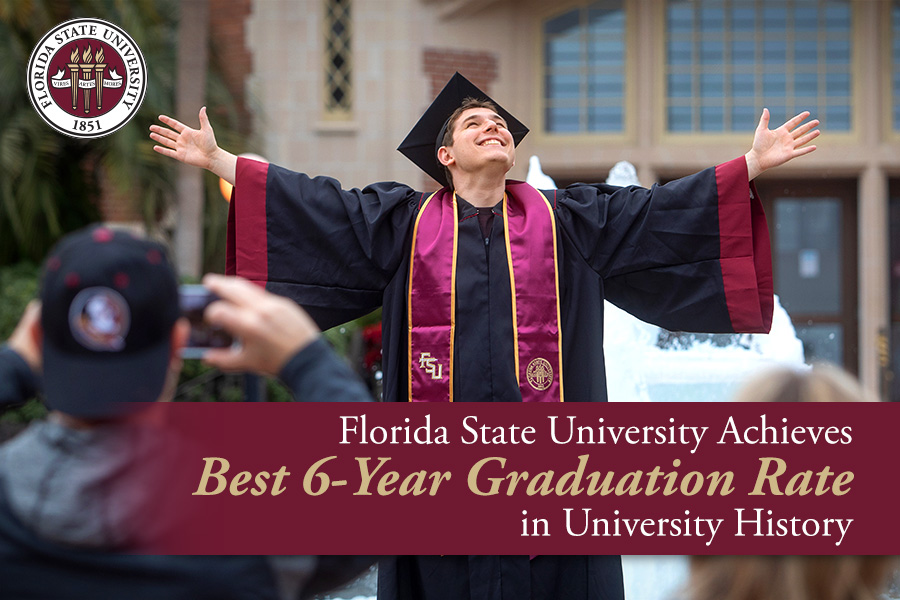
Florida State University’s strategic investments in student success continue to pay dividends as students are graduating with their bachelor’s degrees at the highest rate in school history.
The latest cohort of students (2016-2022) posted the best six-year graduation rate in university history at 85 percent, according to data that will be part of the State University System’s 2023 Accountability Plan.
“Graduation is one of the most important deliverables a university can provide to demonstrate its effectiveness,” said Jim Clark, provost and executive vice president for Academic Affairs. “Our rising graduation rates indicate that we have an infrastructure of faculty, staff, advisers, mentors and peer organizations in place that are devoted to helping every student to be successful.”
Building upon that infrastructure to bolster student success is a priority for Clark and President Richard McCullough. Over the past year, Florida State increased support for its academic advising staff and expanded FSU’s nationally recognized Center for Academic Retention & Enhancement (CARE), which provides programming and support for first-generation students.
“Our core strategy around students is making sure they have some of the very best advising in the United States,” Clark said. “I think everybody who’s been to college remembers their first semester as a very confusing, disorienting, exciting and exhilarating experience. We have a team of academic advisers who focus on everything from out-of-state students who don’t know anyone to students who have very specific goals to student-athletes.”
Joe O’Shea, associate provost and dean of Undergraduate Studies, acknowledges that at a big university like FSU it can be hard to find your way, and that’s why the university’s foundation of individualized support for all students is crucial in helping them to graduation.
“Graduation is one of the most important deliverables a university can provide to demonstrate its effectiveness. Our rising graduation rates indicate that we have an infrastructure of faculty, staff, advisers, mentors and peer organizations in place that are devoted to helping every student to be successful.”
— Jim Clark, provost and executive vice president for Academic Affairs.
“We have intentionally designed a learning community where students can immediately feel connected, where they have the guidance and advising they need to thrive,” O’Shea said. “Our faculty members have been incredible in updating courses and teaching in ways that empower all of their students to realize their unique goals and grow to their full potential.”
This support ecosystem has benefitted all students, no matter their background. Notably, Florida State has eliminated graduation rate disparities across its diverse student body, also posting its highest six-year graduation rate for Pell Grant recipients at 83 percent. The Federal Pell Grant Program provides need-based grants to undergraduate students to promote access to postsecondary education.
“Our students from historically underrepresented backgrounds graduate at the same high rate as the rest of their peers at FSU, which is an accomplishment that very few universities have achieved,” O’Shea said.
And the earlier students graduate, the sooner they can start their careers. That’s a win for families paying tuition and for the Florida workforce.
“Our students can begin their careers earlier with much less debt than other schools around the country and with full knowledge and skill sets that they need to be successful at entry level and beyond,” Clark said.
Last year, the Association of Public and Land-grant Universities presented FSU with the Degree Completion Award — widely recognized as the nation’s most prominent award for student success — for its outstanding efforts to raise graduation rates.
Florida State’s most recent four-year graduation rate tied its previous record of 74%.
The university’s commitment to student success also has fueled Florida State’s rapid rise in the U.S. News & World Report “Best Colleges” rankings over the past several years. On Sept. 12, U.S. News recognized FSU as the No. 19 public university in the nation —the fourth consecutive year it has placed in the Top 20.
O’Shea said FSU’s focus on continuous improvement in student success areas is not going to change.
“We want to do the best we possibly can for the students, their families, and our state and our country,” he said. “And we’re never going to stop. That’s a continuous mission for FSU, and I’m really proud to be part of a university that prioritizes students and does everything it can to help them be successful.”




